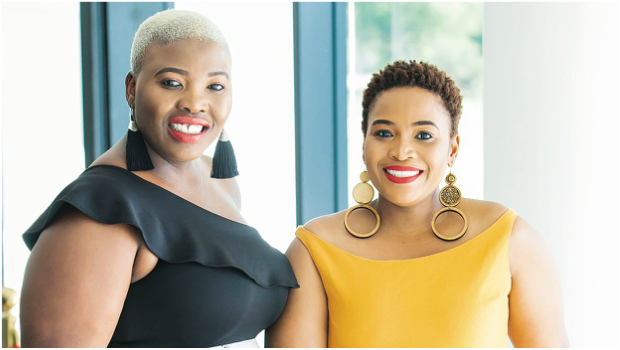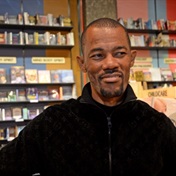
Although they don’t support polygamy, they believe rural, traditional women should have a voice and be allowed to live in whichever way they want. Fighting for the rights of women is something the two stars have in common, whether it’s their right to dress, behave or live as they please.
When we catch up with Isibaya stars Celeste Ntuli and Ayanda Borotho, they’re bubbly and vivacious. They can’t help but gush about Siphokazi and Phumelele, who are both married to respected taxi owner Mpiyakhe Zungu in the hit Mzansi Magic show.
Celeste initially auditioned for the part of obedient Phumelele, but fate had other plans. “When the person who was cast as Siphokazi couldn’t make it, I had to play her,” the 39-year-old tells DRUM.
The outspoken stand-up comedy star could barely believe her luck and was shocked to learn she’d be working alongside industry heavyweights such as Siyabonga Thwala and Thembi Nyandeni.
“I had to call the producers just to confirm it was the same show. I thought they’d made a mistake. I knew then that this was going to change my life.” Adjusting to her role was tough in the beginning but she soon got stuck into her pinafore-wearing, doek-donning character. Celeste reveals she doesn’t set foot in studio without wearing her petticoat.
“It’s a subconscious thing, as it helps me jump into character.” Celeste – who has never been married – had to dig deep to prepare for her role and to understand the perspective of women in polygamous relationships. “Siphokazi doesn’t have issues with her life, she’s happy,” she explains.
“She has a husband who loves her, despite her being unable to bear him children. I wanted to get into the mind of that woman.”
There’s nothing amusing about her character, she says. “She’s not funny. When she speaks, she’s not making a joke. We don’t take the time to understand women like Siphokazi – instead, we laugh at them.”
Playing traditional Siphokazi has opened Celeste’s eyes. “You can’t play someone you don’t like or empathise with.” Her first encounter with Celeste was rather awkward, Ayanda recalls. “I had no idea who she was. She walked on set with her larger-than-life personality, but she was a bit timid because she was new to acting.”
As Celeste’s on-screen sister-wife, Ayanda – who has years of experience that include roles in the SABC1’s comedy series Nomzamo, Soul City and Generations – was more than happy to show Celeste the ropes.
Ayanda also had to stretch herself to bring Phumelele to life. “When they throw a storyline [at you], you have to go with it. There are things viewers don’t think Phumelele would do, but she does them,” she says.
“Suddenly we see that she has a voice and an opinion. She stands her ground, something she wasn’t doing five years ago. I had to search within myself to give the best performance.” Ayanda’s happier than she’s been in a long time, both professionally and personally. Last year was one of rediscovery, the mother-of-three explains.
“We find ourselves doing things because we think we should. There’s a belief that women need to be a certain way. But I wasn’t happy with who I’d become. I couldn’t relate to who I was because I didn’t know who I was anymore. So I went on a journey of getting to know Ayanda.”
This included writing and documenting her feelings – something Ayanda had stopped doing. “There was some kind of shift in myself. I questioned things I wasn’t happy with. There were things I was doing because I thought they were expected of me but no one had ever said they were.” Ayanda describes this process as “unbecoming to become”. “It’s about unbecoming everything the world ever said you were. I’m reversing and unconditioning everything I’ve ever been told.”
She believes she lost a part of herself because there were too many things vying for her attention. “We are born to nurture and restore and give birth. We do it well and effortlessly – we are conditioned to be that way. You just forget about yourself] and I pray we don’t die before finding ourselves.”
Women need to define themselves, Celeste adds. “As much as I don’t believe in polygamy, male patriarchy and chauvinism, I’m also not a feminist. I’m a human being and I don’t like to box myself. “I met Nonhle Thema and she asked me who I was in the industry. I wasn’t offended because that’s what people do – they want to define you. And if you’re not a rural girl, then who are you? Can I be Celeste?
Being Celeste means being true to herself, says the self-confessed unconventional TV star.
“I have a big voice, I’m darker, bigger and don’t wear make-up. I’m not a slay queen. I don’t represent all that’s out there.”
Celeste and Ayanda both feel strongly that South African women should be empowered on various levels. For years women have been expected to be in the kitchen cooking for their husbands, Celeste says. But she wants to use her fame to change how black women are represented. There are people who are sexy but have nothing to offer mentally. We’re faced with being painted as cheap. I see naked women getting airplay, but I don’t get it for my shows, which are sold out most of the time.
“The description of a black woman is prescribed by circumstances, not what we want it to be.”
Changing the perception of women is something close to Ayanda’s heart too – she facilitates corporate workshops, which Celeste emcees, to create dialogue on women’s empowerment.
“I’m not here to change the world, just my corner,” she says.
“But I hope I can inspire someone to change their world and that multiplies the effect. Girls are born with a certain magic but we have to dim our light because it shines too bright for others.”
The actress’ passion for women’s empowerment goes way back. When she became pregnant at 22, Ayanda says she was rejected by her community.
“I became damaged goods by virtue of having a child out of wedlock – nevermind that the man who got me pregnant was my first and only. He had other women and I was left with the stigma – no one rejects the man.”
Ayanda later found love and is married to a doctor with whom she has two children. Yet being a wife and mother doesn’t define her. “Before I’m a mother and a wife, I am Ayanda. I must come first.”
Outspoken Celeste couldn’t agree more. “I don’t care about the ring. What if I don’t get married nor have kids – does that make me less of a woman? What’s important is whether I experienced the love in this world.”
Ayanda and Celeste admire each other on and off screen. “Ayanda loves being a mother – it’s not forced,” Celeste says. “It reminds me of my mother. Looking at how she welcomes the vulnerabilities of being a woman helped me put my guard down. I’m now a bit softer and more vulnerable to certain things because of her.”
Ayanda is teaching her children to be independent and know their worth, like Celeste. “Celeste is genuine. She’s a hustler and doesn’t try to fit in with the crowd. What you see is what you get. We have an honest and frank relationship.”
The doting mother sacrificed time with her children while tackling a new role in an e.tv series set to air early this year. “Shooting was hectic and my kids would go to bed without seeing me.” Ayanda can’t divulge much more yet, but reveals she’ll play the conniving wife of a politician. She’s also thrilled to be working on The Story of Nandi, a feature film inspired by Shaka Zulu’s life, and hopes it will help change the perception of women in history. “[Shaka’s mother] Nandi was a pillar and strength to Shaka. He was raised by his mother and we forget these women in history. We constantly have to prove to the world we are worthy. This is a story of triumph and resilience.”
Celeste, meanwhile, has her hands full juggling two careers. Last year she took a break from Isibaya to take her comedy career international with shows in Nigeria and Los Angeles. “I feel like in comedy I have a voice. People need to understand that I need to grow too. It can’t be like this forever. Everyone has a five-year plan – it’s not easy to carry this character because Celeste has to exist too.” She has no plans to quit acting anytime soon though. Celeste recently landed her debut leading role in the forthcoming feature film Looking for Love, in which she plays thirty-something single workaholic Buyi Dube.
“I wanted to show my diversity. She’s crazy and there are crazy sex scenes. For a big girl it was very important for me to play the character that way, representing that normal girl who isn’t represented. She’s not your Kim Kardashian West.”
Like Buyi, Celeste also has an eye for foreign men. She reveals she’s never dated a South African man because of their attitudes towards women. “The ugliest girl in Nigeria is treated like an It girl. I’m not pink, I don’t wear weaves. I’m not what they [SA men] want but I’m not going to change and sell myself short.”
South African men don’t treat women the way they should be treated, she adds. “No one says anything about them being fat, diabetic and unhealthy – but they say such mean things to women,” says Celeste. Society needs to change, Ayanda believes. “We raise the girls and protect the boys but we expect girls to marry boys. We are broken. We need to wipe the slate clean and start from scratch. “
Our men are raising broken boys because they are also broken. Instead of dealing with it, they do things [like alcohol or physical abuse] to fill the hole.” Thankfully, Ayanda and Celeste seem to be doing their part.


















